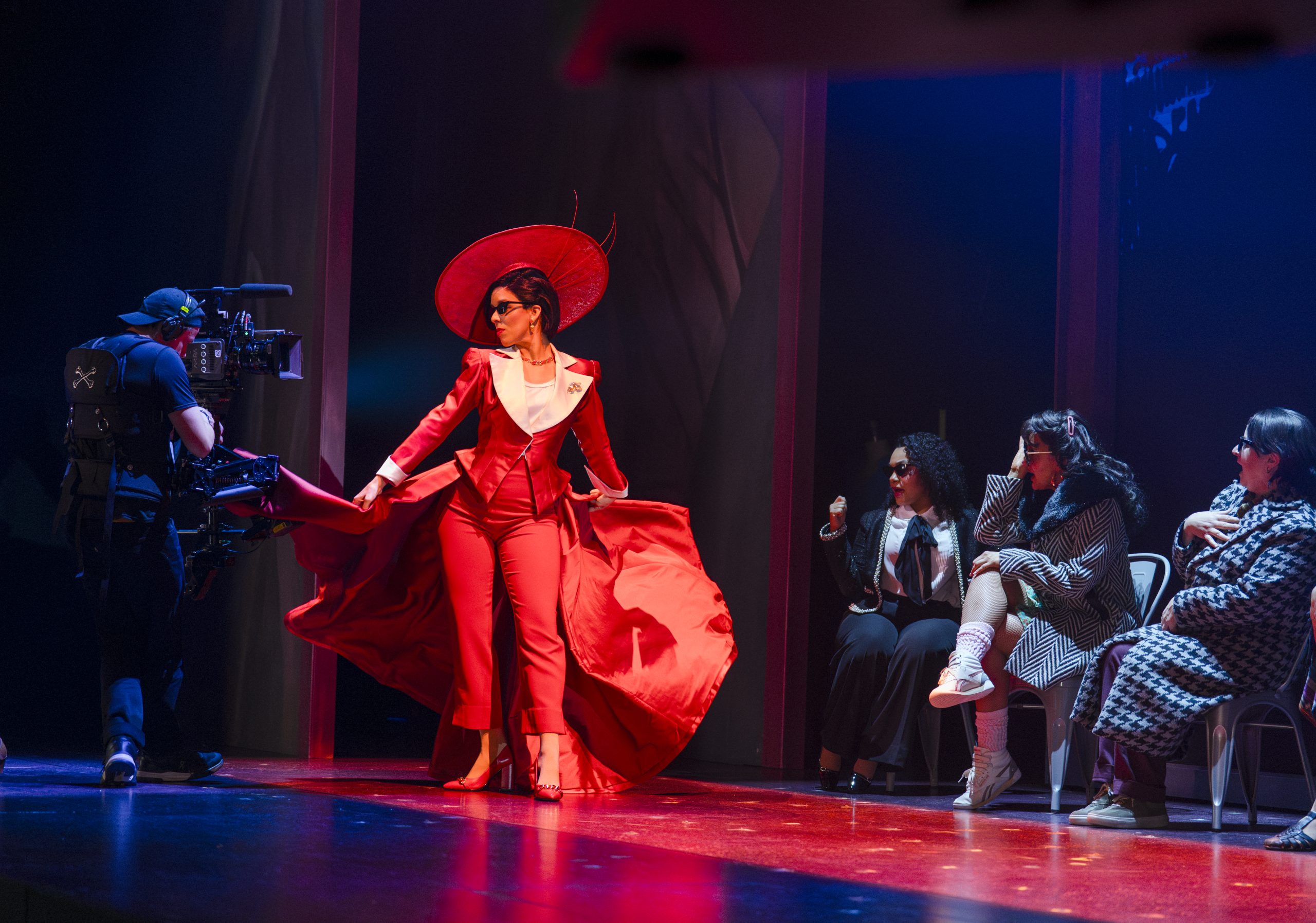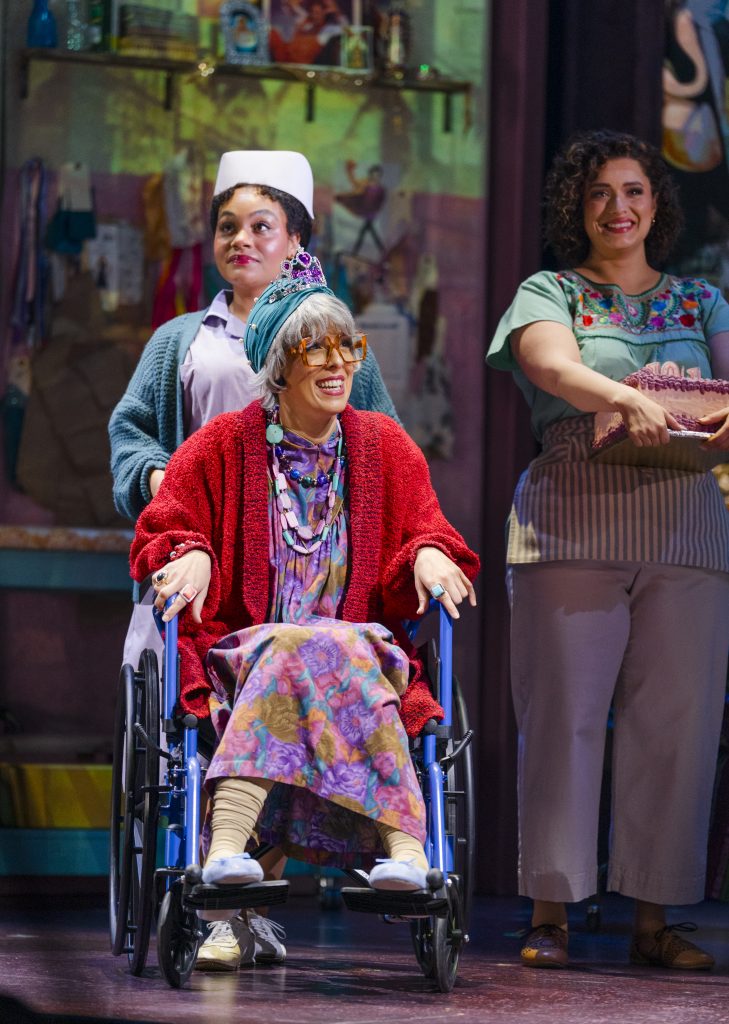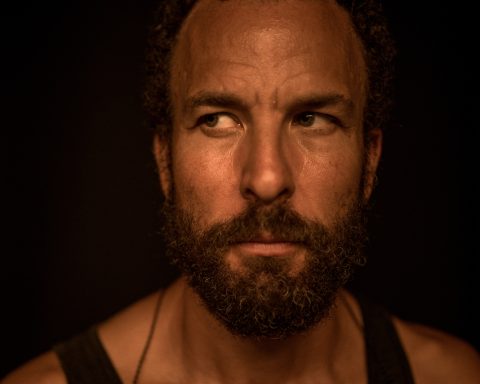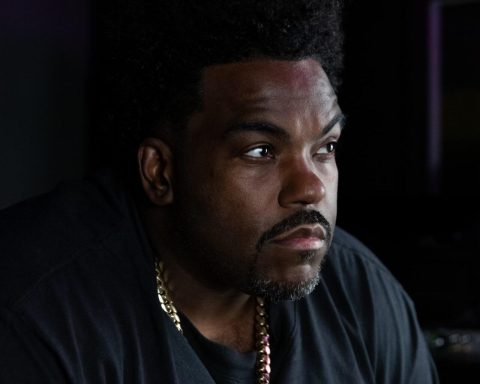Broadway is one of New York City’s most iconic attractions, powered by instrumentalists, singers, actors, and dancers. Cast members who take to one of its 41 stages endure a rigorous audition and training process. As for the instrumentalists, the journey to the orchestra pit can be unpredictable. Step behind the curtain as seven accomplished musicians share how they made it to Broadway.
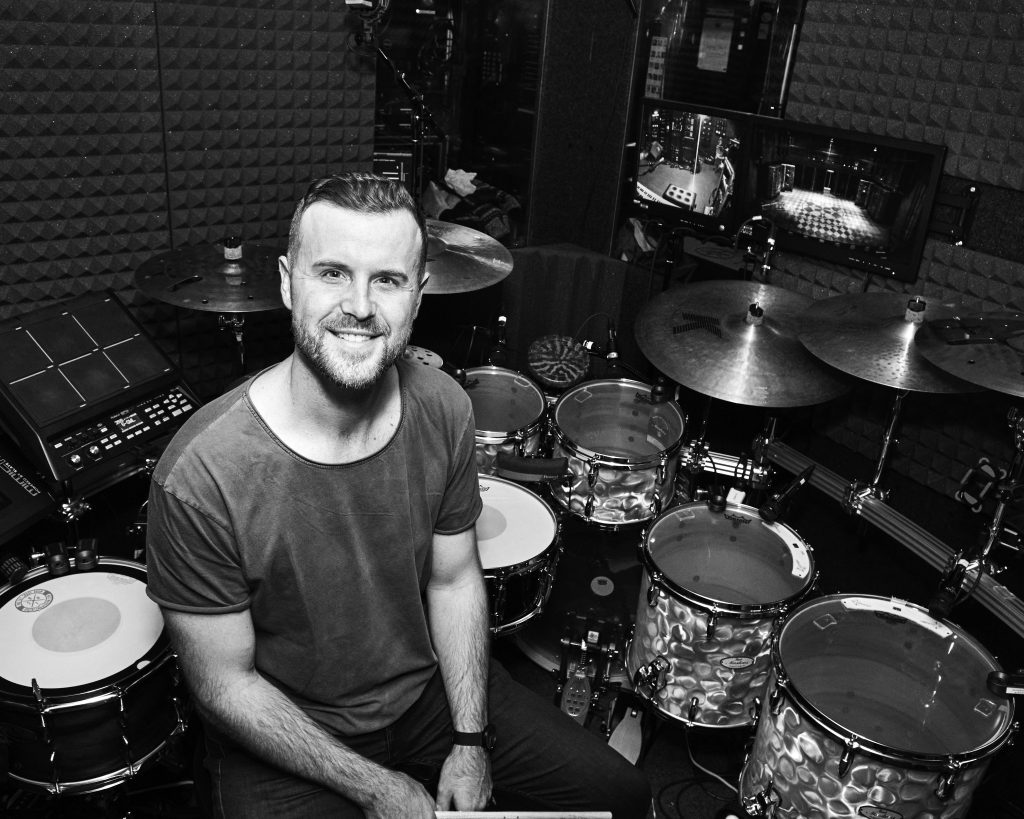
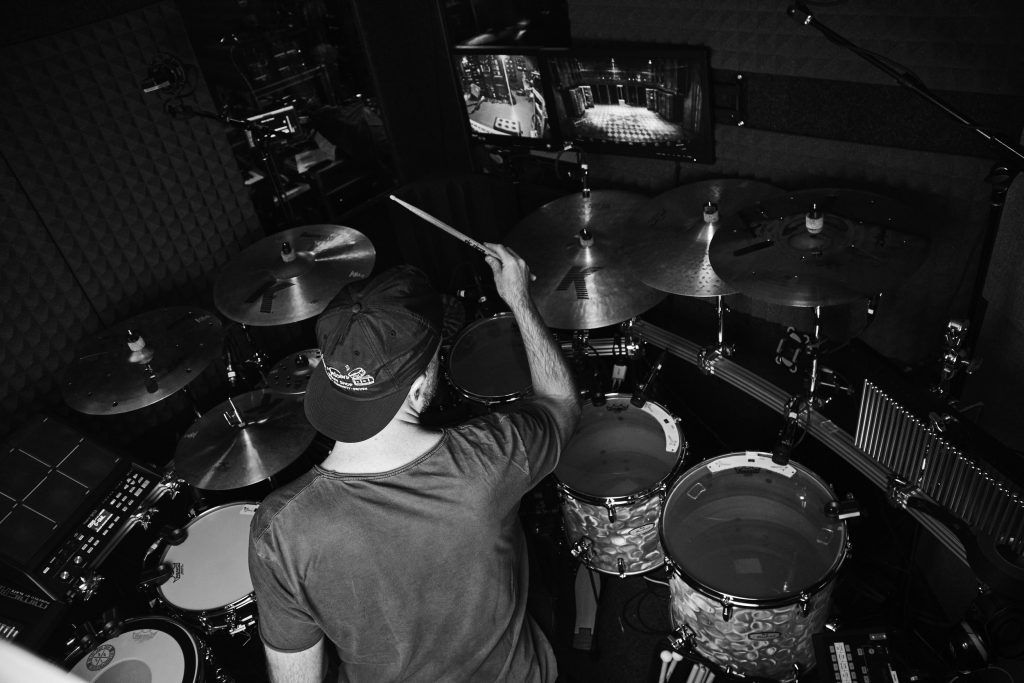
SAM MERRICK
Sam Merrick, drummer for the jukebox musical &Juliet, didn’t always plan to pursue music professionally. While majoring in Communication Studies at Boston University, he kept gravitating toward drumming. Growing up in a jazz-filled household, taking countless private lessons, practicing, and gigging as often as possible prepared him for his Broadway career. His first theatre gig? The US tour of the hit musical, Hamilton.
“On the road, you’re doing eight shows a week, every week. There are no substitute drummers, so you’re expected to play through sickness or exhaustion,” he reveals. “That grind takes a toll. But until that point in my career, it was the best job I had ever had. I played around 1,200 performances and wouldn’t trade that experience for anything.”
As the tour drummer for Hamilton, he aimed to serve the show exactly as written. Now that he’s back in New York as the drum chair for &Juliet, he has more creative freedom. Encouraged to bring his unique voice to Max Martin’s classic songs in the musical, Merrick embraces hard-hitting dynamics and over-the-top fills.
“One day, we were rehearsing a section of ‘Can’t Stop the Feeling‘ where the drums fill through a few bars of band hits,” he says. “I played something in the moment, the choreographer caught it on video, and built the choreography around it. Those fills are still what’s on the page today.”
For &Juliet, Merrick uses a Roland RT-30K trigger for the kick, and RT-30HRs for every other drum. “There are samples that live in the Roland SPD-SX pad as well, most of which are the stems bounced from the original Max Martin tracks,” Merrick says. As arrangements evolved during rehearsals, he made some adjustments. Now, his SPD-SX configuration is used across all &Juliet productions globally.
"I played something in the moment, the choreographer caught it on video, and built the choreography around it. Those fills are still what's on the page today."
SAM MERRICK
MIKE BONO
Starting his Broadway journey as a substitute guitarist for several musicals, including Dear Evan Hansen, Mike Bono became the guitar chair at King Kong before landing his current position at &Juliet at the Stephen Sondheim Theatre, where he switches between five guitars nightly.
A Presidential Scholarship recipient at Berklee College of Music, Bono was destined for success. He didn’t plan on a Broadway career, but it fit his lifestyle naturally. “You can be on tour and play the same music every night. But you’re also traveling every day, you’re not sleeping well, maybe you’re not eating well,” Bono says. “On Broadway, you do the same thing every night, but then you can go home and sleep in your own bed.”
Unless he has other engagements, he often plays six shows a week, taking two off. When a gig gets monotonous, he finds inspiration on the road, on his terms: “I was out for most of June. Having some space from the show hits the reset button.”
One of Bono’s favorite Broadway memories was working with Max Martin while recording the cast album for &Juliet, which drummer Sam Merrick also played on. “Most Broadway cast albums are done in a couple of days—full band, totally live,” he explains.
Those three days were much needed for moments of improvisation. After Bono played all the arranged parts, Max Martin would sing some lines and ask him to play them back. “Max was adamant about doing this album like a pop record,” Bono says. “I was lucky to have three days of doing just guitars.”
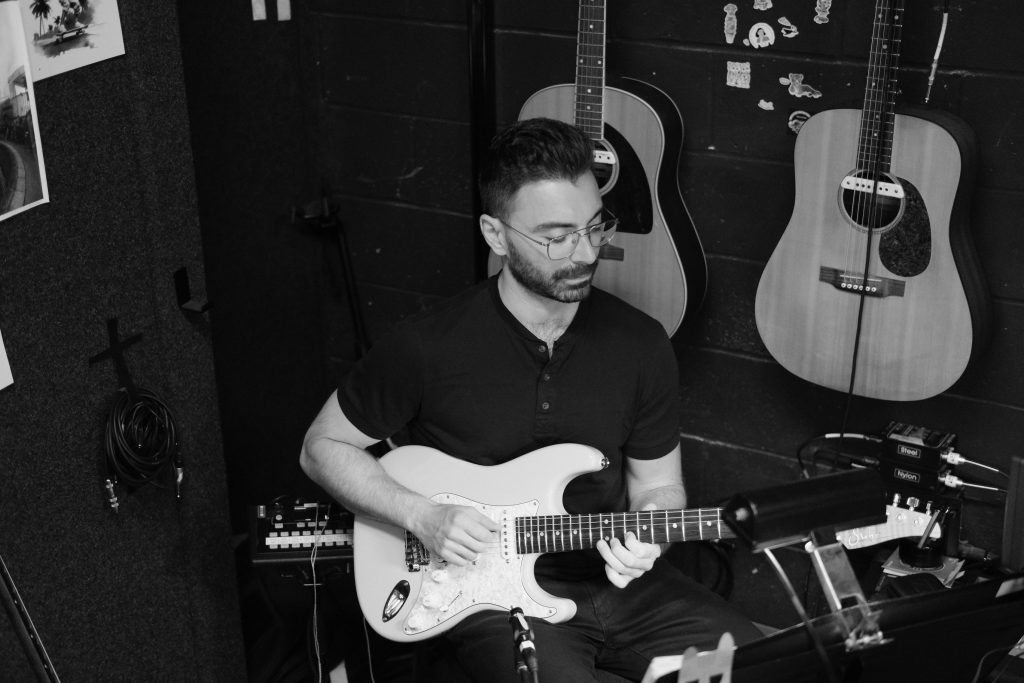
"Max Martin was adamant about doing this album like a pop record. I was lucky to have three days of doing just guitars."
MIKE BONO
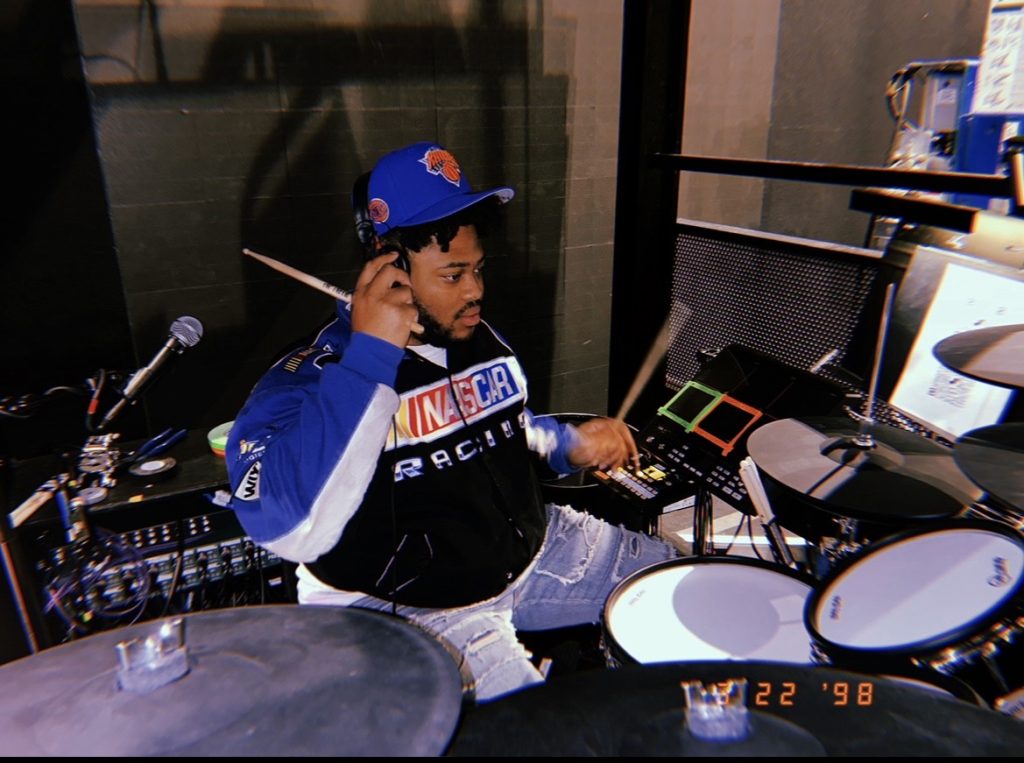
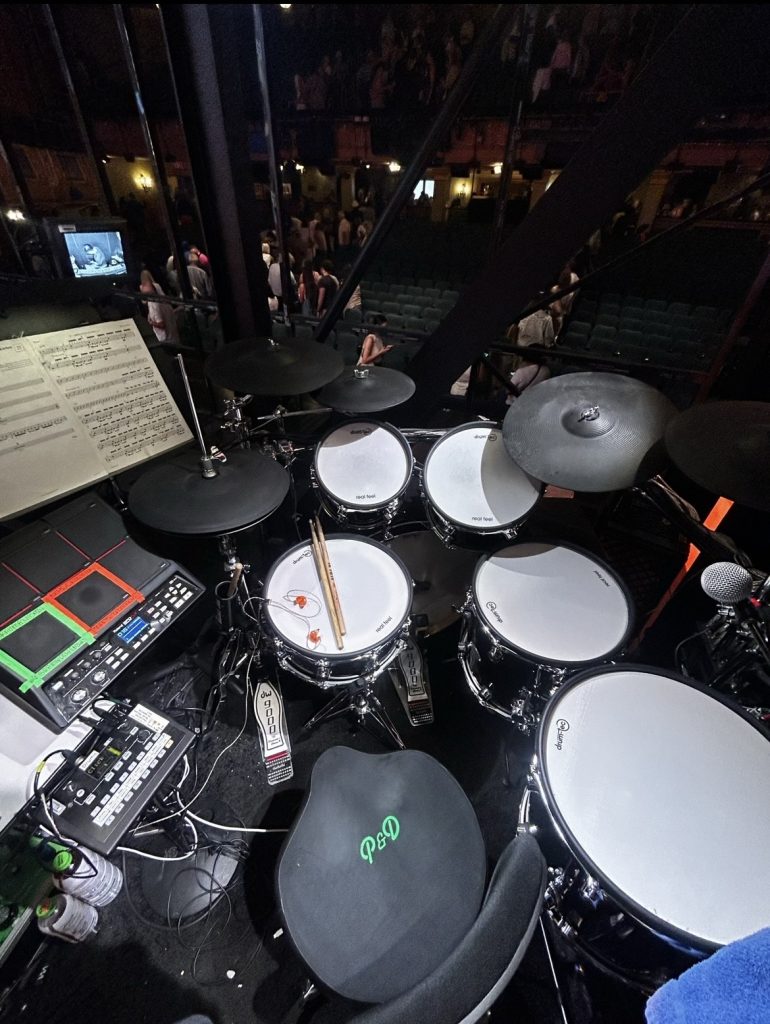
JAYLEN PETINAUD
Jaylen Petinaud holds the drum chair at Alicia Keys’ musical, Hell’s Kitchen. He often subs out his shows for months—especially when he gets calls from living legends like Herbie Hancock.
“As a freelance musician, I try my best to fulfill both sides, because you never know when a show will close,” Petinaud admits. “Being able to tour with Herbie and come home to a Broadway show is a dream situation.”
A Brooklyn native, Petinaud targeted Broadway early in his career after graduating from SUNY Purchase. “I broke into the Broadway scene by being hired for various workshops as a rehearsal drummer,” he says. “That’s the perfect way to connect with different musicians and music supervisors.”
When he got hired as a rehearsal drummer for Terrence Blanchard’s Champion at The Metropolitan Opera, he had no idea Blanchard himself would be there. Blanchard later recommended Petinaud to Herbie Hancock. “After two years, I’m still in shock,” he says. “Everything happened so fast.”
Though he enjoys playing an acoustic drum set on the road, Petinaud plays electronic drums, Roland electronic cymbals, and an SPD-SX pad in Hell’s Kitchen. With Alicia Keys’ R&B-laden discography, relying on the SPD-SX pad to play samples of snaps and claps throughout the show is essential.
When he auditioned for Hell’s Kitchen, Petinaud was new to electronic drums, but quickly found his groove: “It took me two weeks to feel settled on the electronic drums. There’s nothing like playing acoustic drums.” These days, he’s fortunate to play both on and off Broadway.
"Being able to tour with Herbie Hancock and come home to a Broadway show is a
dream situation."JAYLEN PETINAUD
IAN BARNETT
Another Berklee grad, Ian Barnett, debuted on Broadway when Sam Merrick gave him a shot as a substitute drummer in &Juliet almost a year ago. He also recently began subbing for Jaylen Petinaud in Hell’s Kitchen.
“I talked to a few friends, and they gave me some names to reach out to. I messaged Sam and Jaylen and told them I was interested in watching the show sometime. They were both nice and invited me down,” he says. “It helped that I had some great musicians vouching for me,” Barnett admits, adding: “Even if you don’t end up subbing on a show, it’s great to meet other drummers.”
Barnett had plenty of experience touring with pop acts like Betty Who and Joshua Bassett and playing corporate gigs around town. Still, none of these jobs were consistent enough to fend off dry spells. “The biggest motivator at first was dependable income,” he explains. “From a playing perspective, the idea of learning the show, and having it ready to go whenever I got the call was also appealing.”
When he finally got that first call from Sam Merrick, he wanted to be as prepared as possible. Though his first show at &Juliet flew by, Barnett was more alert when he played Hell’s Kitchen for the first time. “Being on stage at Hell’s Kitchen feels different than being in the basement in a little drum room at &Juliet,” he says. “The stage moves during the show; I’m just glad I didn’t fall off my drum throne.” That danger is no small concern since subs cannot alter the chair’s setup.
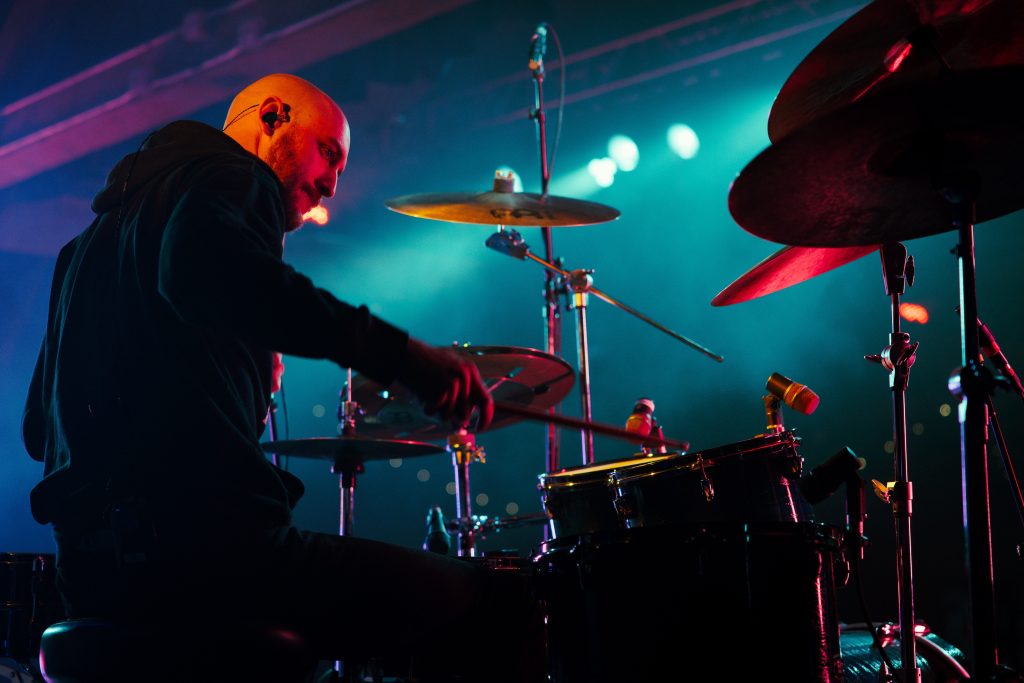
"The stage moves during the show; I'm just glad I didn't fall off my drum throne."
IAN BARNETT
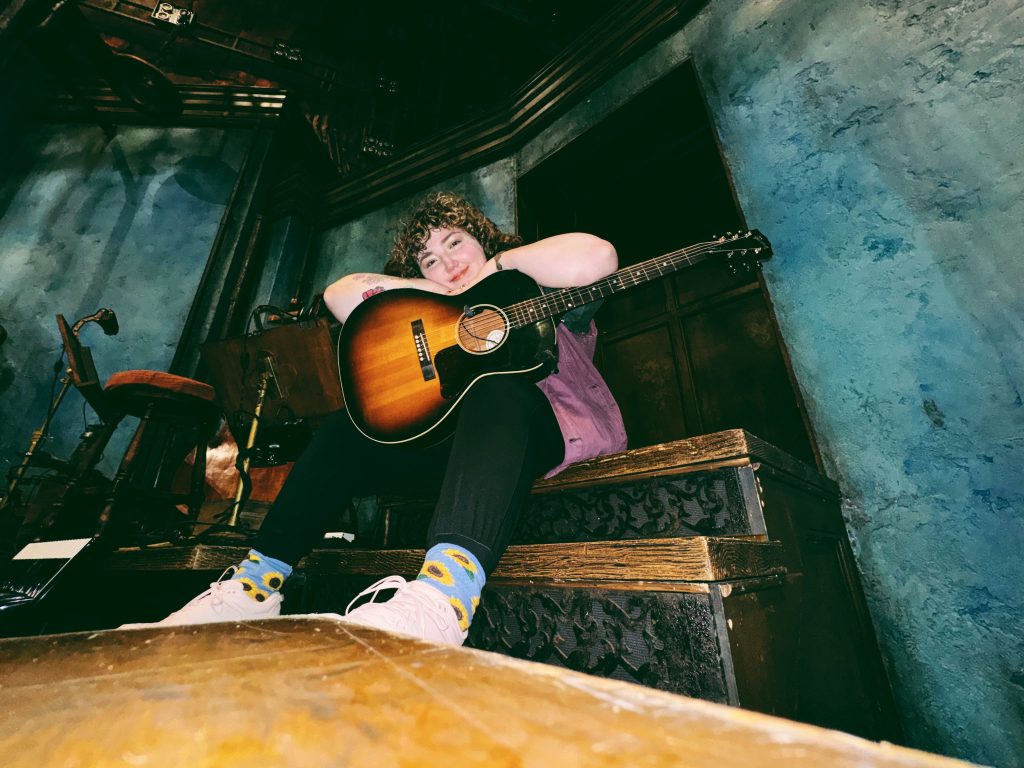
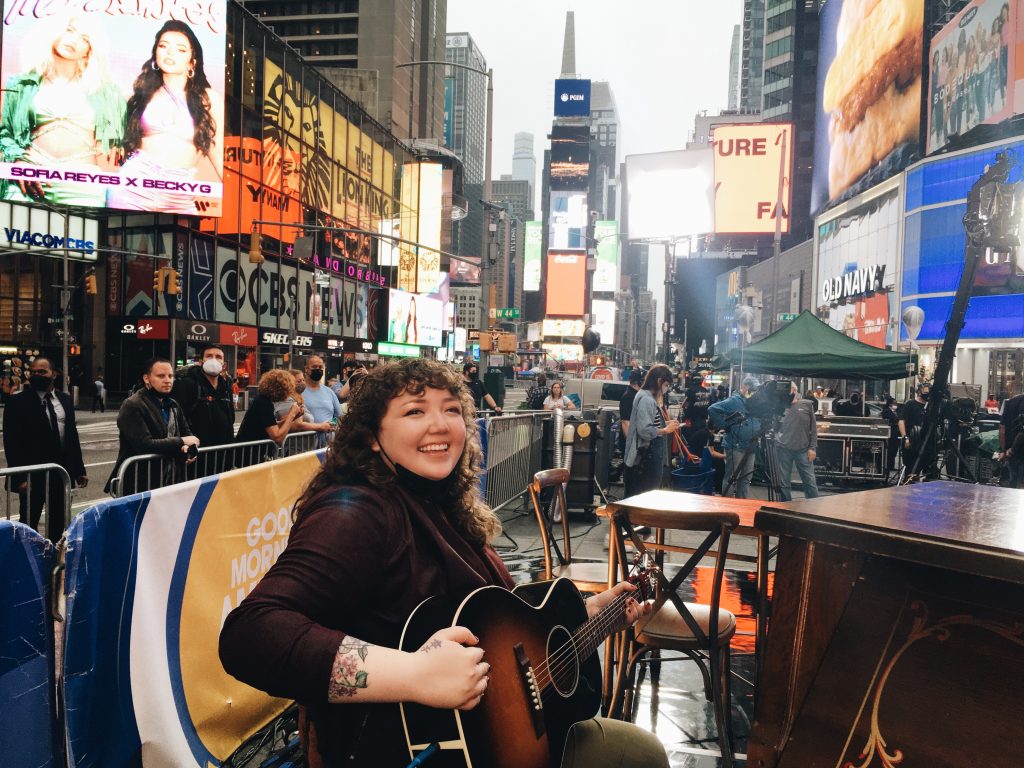
MICHIKO EGGER
Guitarist Michiko Egger has become a familiar presence on Broadway tours and sub lists. Before launching her theater career, she was gigging so often that she finished high school online a semester early and headed straight to New York.
Playing countless local gigs eventually led her down the Broadway path: “I sat in at a jam session in Brooklyn and suddenly, I was getting calls for all sorts of things,” she recalls. “I ended up leaving for the SpongeBob Musical First National Tour with five days’ notice.”
Next came Hadestown, where she served as the touring guitar chair. “You don’t sub out. You play all eight shows,” says Egger, echoing Sam Merrick. Hadestown was a particularly hard show to try to sub out of, because it involved a prepared guitar. “I’ve never heard of another show that uses craft wire, newspaper, and foam to alter the sound of an instrument,” Egger says. “The application of the materials is fast and meticulous. It’s not a show someone could come in and sightread in an emergency.”
Nowadays, Egger subs for Hadestown and Death Becomes Her on Broadway in New York. As a multi-instrumentalist, she’s well-positioned to maximize her earnings. “You get pay bumps for doubles, as well as being on stage and being in costume. Doubling is great because it gives you more job opportunities,” she says. “I learned to play the banjo and ukulele when I got called to go on tour with The SpongeBob Musical. I learned mandolin when I got a call to sub for Teeth off-Broadway.”
Looking ahead, Egger aims to develop the guitar chair for a new Broadway musical. “That’s been a goal of mine for a while. Hadestown gave me so much room to sound exactly like myself. I’d love to do that again.”
"Hadestown gave me so much room to sound exactly like myself. I'd love to do that again."
Michiko Egger
ALEXANDRA ECKHARDT
Alexandra Eckhardt originated the bass chair for The Outsiders, the Best Musical Tony Award winner of 2024. As a seasoned Broadway musician who has been active since graduating from UCONN, she witnessed the impact of word-of-mouth firsthand.
“I played for an elementary school production of Bye Bye Birdie in Chappaqua, NY. The music director mentioned that auditions were being held for the upcoming non-equity tour of In the Heights and that I should submit materials,” Eckhardt recalls. “After multiple rounds of submissions, I had my audition with Alex Lacamoire, the orchestrator and music director of the show on Broadway.”
Landing that gig led her directly to the next one: “As the tour was ending, the first national tour of The Book of Mormon was gearing up to go on the road, and my name had gotten thrown in the mix,” she says. “I remember being in Dallas and getting an email from the contractor. I was being considered, and Alex’s endorsement sealed the deal.”
Once she moved to New York, Eckhardt leveraged her tour experience to land as many gigs as possible. “At one point, I was subbing at nine shows, which was insane, but I loved keeping things fresh,” Eckhardt explains. “By learning each player’s style, I incorporated certain elements into my own playing.” It’s not an easy road. “As a sub, you learn the ropes of what to do and what not to do when you hopefully become a chair holder.”
Since then, Eckhardt has held the bass chair on several Broadway and off-Broadway shows. On The Outsiders, she also took on the role of in-house contractor, managing musician attendance, payroll, and other duties. On her days off, she works as a music supervisor, lending her talents to TV and film projects.
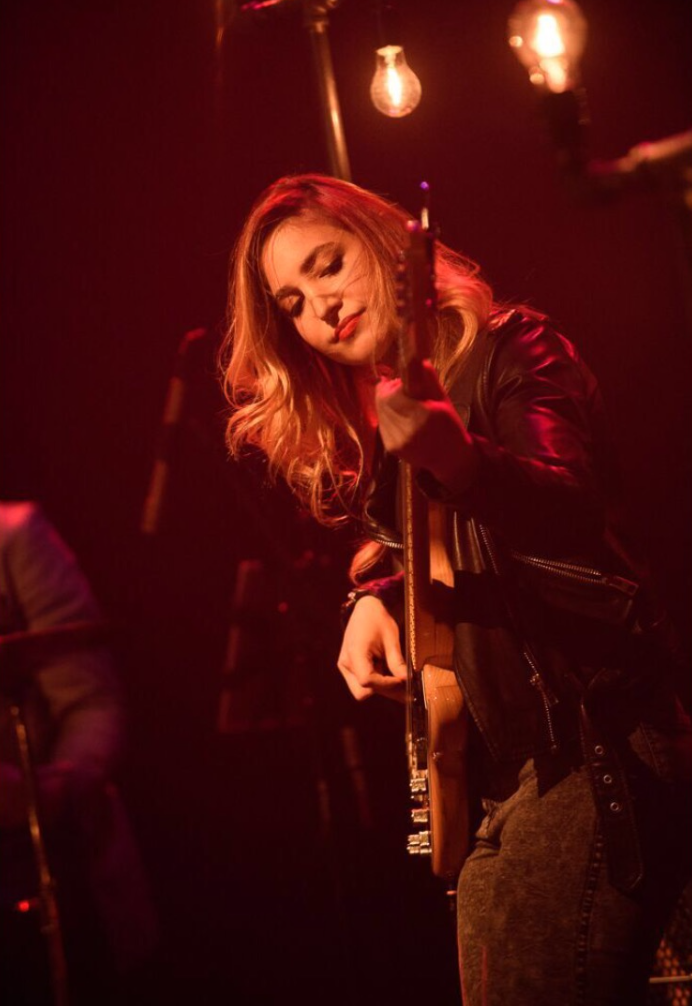
"As a sub, you learn the ropes of what to do and what not to do when you hopefully become a chair holder."
ALEXANDRA ECKHARDT
CLAUDIA MULET
Cuban actress Claudia Mulet debuted on Broadway as an original Real Women Have Curves cast member. Unlike her colleagues in the orchestra pit who are members of the American Federation of Musicians, she’s registered with the Actors’ Equity Association. Having played multiple speaking roles in the show—among them Mrs. Wright and Soledad—she credits her union for accurately tracking her earnings.
“I was contracted as an ensemble member, which comes with a base rate. Additional fees depend on the specifics of your role. Speaking roles qualified me for extra compensation.” Mulet explains. “I was also the understudy for two principal characters: Estela and Rosali. Understudy roles come with an additional weekly fee.”
As an experienced dancer and musician who studied acting in college, Mulet didn’t initially envision uniting her talents into one craft. “In Cuba, much of that tradition was lost after the Revolution, and schools didn’t nurture it,” she recalls. “Moving to New York exposed me to a whole new world and inspired me to embrace musical theater as a complete art form.”
Mulet’s Broadway journey began in 2017, when she joined the first national tour of On Your Feet as an ensemble cast member. That production introduced her to Sergio Trujillo, the director and choreographer behind Real Women Have Curves. He encouraged her to audition, and the rest is history.
Real Women Have Curves had a short run on Broadway. But as a multidisciplinary artist, Mulet isn’t spooked by the industry’s volatility: “I love performing. But I’ve also been shifting my focus toward directing. My accent, body type, and vocal quality don’t always align with the traditional molds of musical theater roles,” she says. “That’s why I’m more focused on creating spaces and characters that reflect people like me—roles that are authentic, diverse, and nuanced.”
"That's why I'm more focused on creating spaces and characters that reflect people like me—roles that are authentic, diverse, and nuanced."
CLAUDIA MULET



